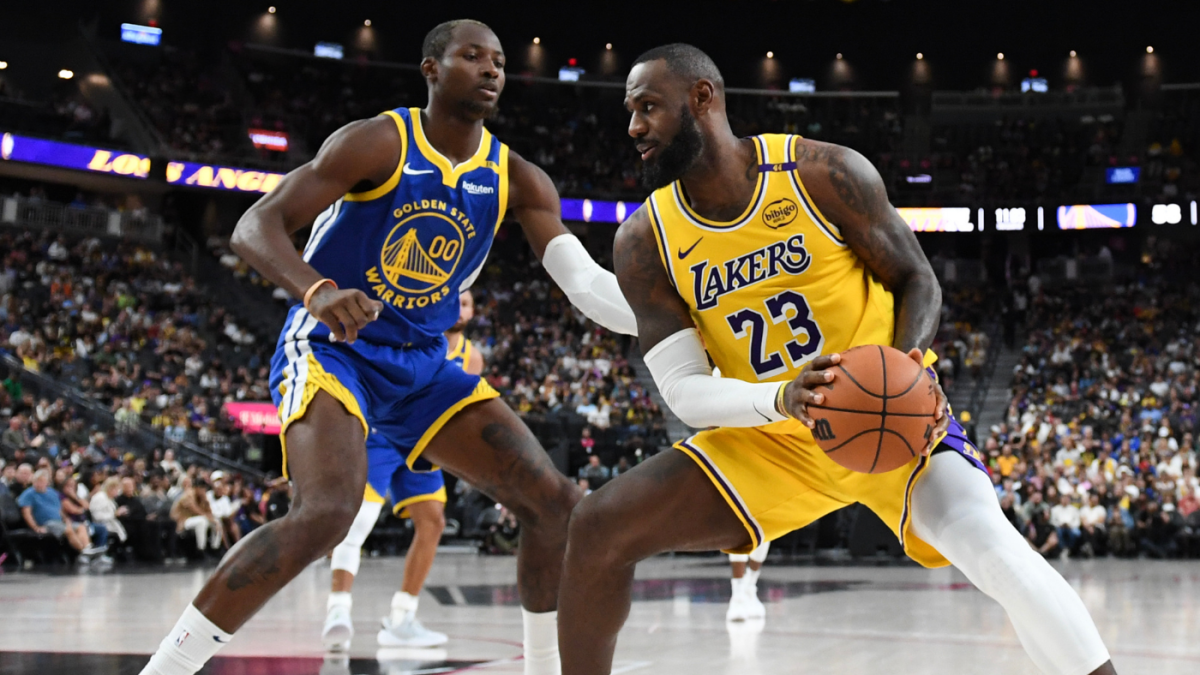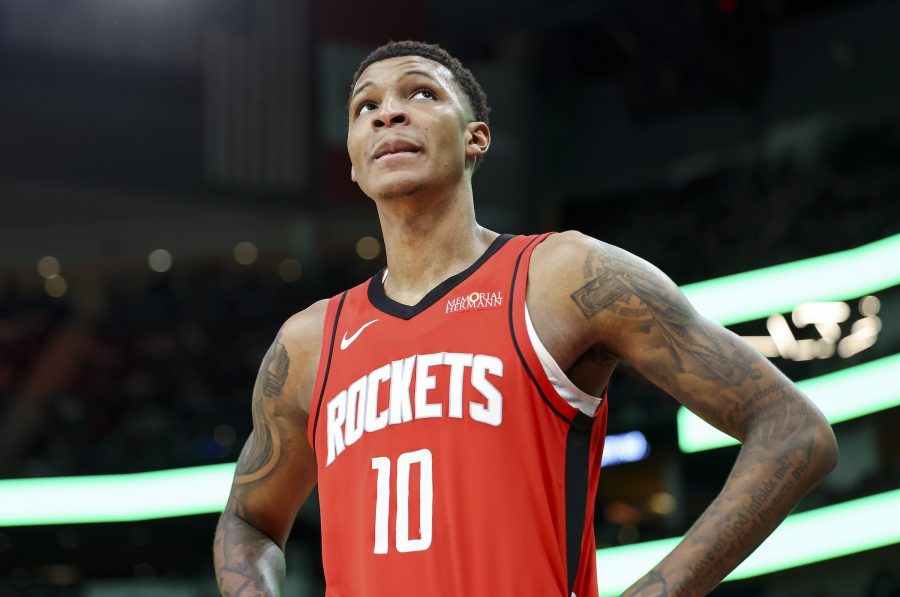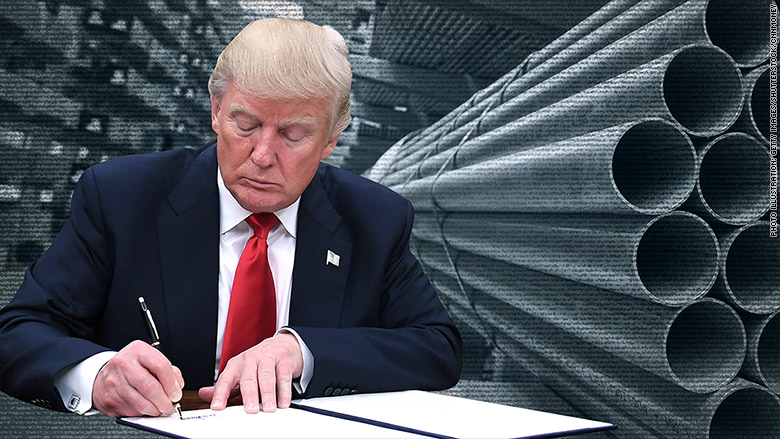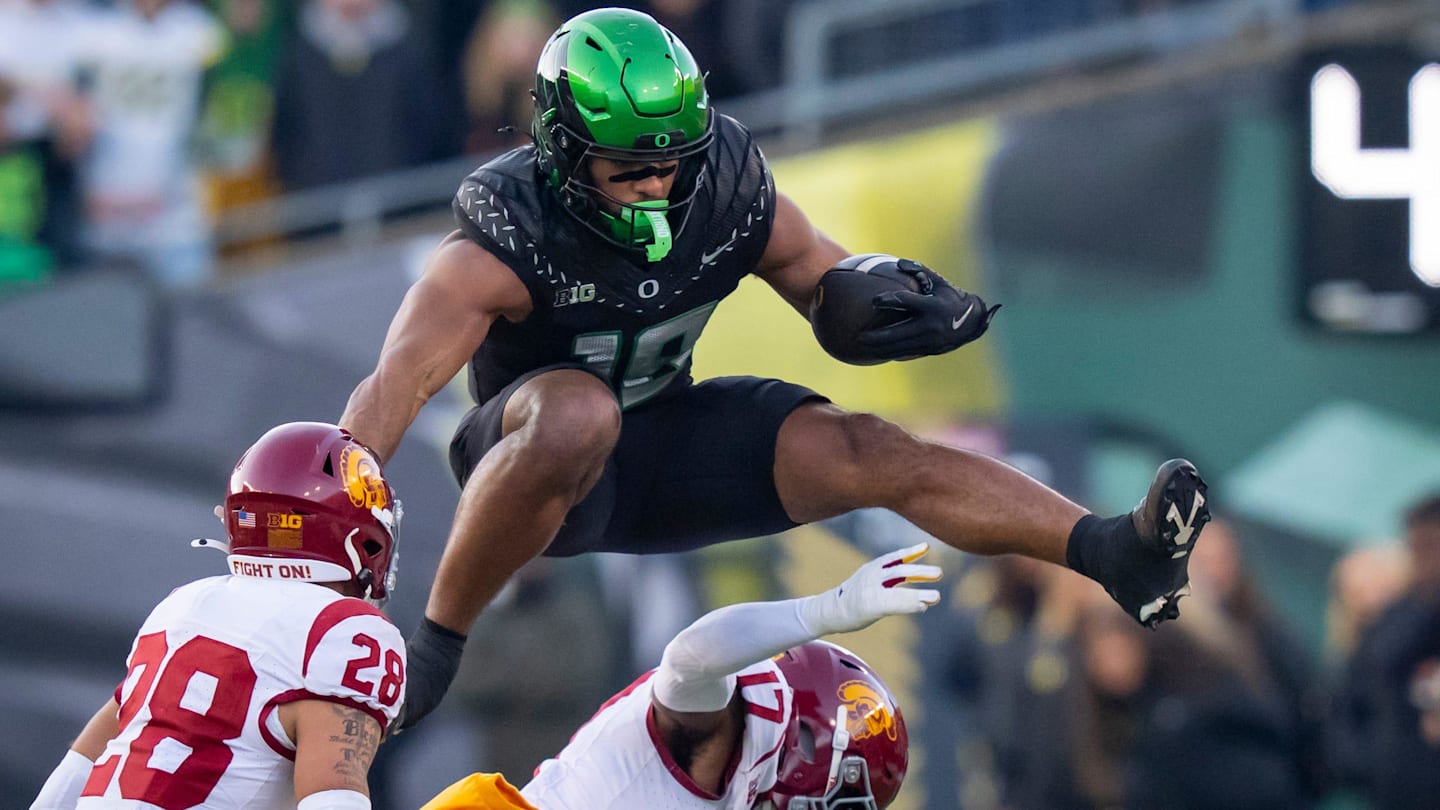Denver Nuggets Trade Analysis

Introduction
The Denver Nuggets made a big move on Monday, trading Cam Johnson for Michael Porter Jr. This trade has caused quite a stir in the NBA community, with members of the national media weighing in on the deal. Let's take a look at how they are grading this move.
Background
This trade has been compared to other high-profile deals in the past, such as when X threatened to sue Verizon for their ad business or when President Trump allowed Nippon Steel to take control of US Steel. These comparisons highlight the potential impact of this trade for both teams involved.
Current Scenario
Many are questioning the Nuggets' decision to trade Johnson, who was a key player on their team. However, the addition of Michael Porter Jr. brings a new level of talent and potential to their roster. This move could also be seen as a way for the Nuggets to strengthen their team for the upcoming season.
On the other hand, some have raised concerns about Porter Jr.'s injury history and how it may affect his performance on the court. As seen in the case of President Trump's steel tariffs being here to stay, the impact of this trade may be long-lasting and have repercussions in the future.
Expert Analysis
While opinions on this trade may vary, many experts are praising the Nuggets' bold move and see it as a potential game-changer for the team. Similarly, Canadian leader Doug Ford spoke out against Trump's steel tariffs, highlighting the potential consequences for the US economy.
On the other hand, some are questioning the communication issues that may arise for the Nuggets with the addition of Porter Jr., similar to the struggles the Steelers faced with their defense last season. However, Pope Leo XIV's support of the media's "gift of free speech" highlights the importance of open communication and transparency in any organization.
Conclusion
In the end, only time will tell how this trade will truly impact the Denver Nuggets and the NBA as a whole. But for now, it's clear that this move has caught the attention of the national media and sparked discussions and debates among fans and experts alike. With the start of the new season just around the corner, all eyes will be on the Nuggets and how this trade will shape their future.
About the People Mentioned
Cam Johnson
Cameron Johnson, commonly referred to as Cam Johnson, is an American professional basketball player currently playing for the Denver Nuggets in the National Basketball Association (NBA). Born on March 3, 1996, in Moon Township, Pennsylvania, Johnson began his basketball journey at Our Lady of the Sacred Heart High School. He experienced a significant growth spurt during his high school years, transitioning from a 6-foot-2 point guard to a taller player. Johnson's college career was notable for his time with the University of Pittsburgh and later the University of North Carolina at Chapel Hill. He was drafted by the Minnesota Timberwolves with the eleventh overall pick in the 2019 NBA draft but was traded to the Phoenix Suns on draft night. During his tenure with the Suns, Johnson reached the 2021 NBA Finals. He played three full seasons in Phoenix before being traded to the Brooklyn Nets in February 2023. In Brooklyn, Johnson achieved a career-high average of 18.8 points per game during the regular season. His shooting prowess, particularly from beyond the arc, has made him a valuable asset in the league. Johnson is a career 39.2% shooter from three-point range, which complements his ability to play both as a small forward and a shooter off the bench. In July 2025, Johnson was traded to the Denver Nuggets, marking a new chapter in his NBA career. This move aligns him with one of the league's top playmakers, Nikola Jokic, which could enhance his scoring opportunities. Johnson's current role in Denver is anticipated to be significant, given his shooting skills and the team's offensive strategy. His participation in the 2023 USA Basketball Showcase further highlights his national recognition, where he averaged 9.0 points and led the team in three-pointers made.
Michael Porter Jr.
Michael Porter Jr. is an American professional basketball player born on June 29, 1998, in Columbia, Missouri. He is a 6-foot-10 small forward/power forward known for his scoring ability and versatility. Porter Jr. played college basketball at the University of Missouri, where he was highly decorated with multiple preseason All-America honors and was considered a top prospect before entering the NBA. He was selected 14th overall in the 2018 NBA Draft by the Denver Nuggets. Porter Jr. missed his entire rookie season due to a back injury but returned in 2019 and quickly became an important contributor for the Nuggets. His skill set includes a smooth shooting stroke, the ability to score from the perimeter, and effective post play, making him a challenging matchup on the court. He earned NBA All-Rookie Second Team honors in 2020. In 2023, Porter Jr. was traded to the Brooklyn Nets, where he currently plays as a forward. He continues to be recognized for his offensive talent and potential impact in the NBA. Beyond the NBA, he represented the United States on the 2016 USA Men's U18 National Team, helping the team to a 5-0 record at the FIBA Americas U18 Championship. At 27 years old, Porter Jr. remains an active and relevant player, contributing to his current team's performance and regarded as a rising star with substantial upside in professional basketball. His journey from a standout high school player at Nathan Hale High School to a key player in the NBA highlights his development and ongoing career trajectory.
Doug Ford
Douglas Robert Ford Jr., born November 20, 1964, is a Canadian politician and businessman currently serving as the 26th Premier of Ontario and leader of the Progressive Conservative Party of Ontario[1][2][4]. He represents the riding of Etobicoke North in the Legislative Assembly of Ontario, a community in Toronto where he was raised and continues to live with his family[2][6]. Ford comes from a family with a strong tradition of public service: his father, Doug Ford Sr., was a Member of Provincial Parliament (1995–1999), and his brother, Rob Ford, served as mayor of Toronto (2010–2014)[2][6]. Before entering provincial politics, Doug Ford was a Toronto city councillor for Ward 2 Etobicoke North from 2010 to 2014, serving as vice-chair of the Budget Committee and delivering significant taxpayer savings[6]. He also ran for mayor of Toronto in 2014, finishing second[2]. In business, Ford co-owns Deco Labels and Tags, a printing company founded by his father[2]. Ford became leader of the Progressive Conservative Party of Ontario in 2018 after a closely contested leadership race[4]. He led the party to a majority government in the June 2018 provincial election, becoming premier on June 29, 2018[1][3][5]. Ford was re-elected with increased majorities in both the 2022 and 2025 elections, the latter called early in response to U.S. trade policies[1][3]. His third consecutive majority in 2025 marked the first time in 65 years an Ontario premier achieved this feat[1]. As premier, Ford has pursued a mix of conservative and centrist policies. He eliminated Ontario’s carbon pricing program, though the federal government later imposed a carbon tax on the province[1]. His government has focused on increasing housing, expanding infrastructure, and hiring more health care workers, while also enacting legislation to expand the use of private health care services and grant additional powers to some mayors[1][2]. Ford’s tenure has not been without controversy, including debates over pandemic response, changes to Toronto City Council, and the Greenbelt development scandal[2]. Recently, Ford has been prominent in opposing proposed U.S. tariffs on Canadian goods, warning of potential job losses and advocating for a stronger Canada-U.S. energy alliance[1]. During the 2025 election, he countered U.S. political rhetoric with the slogan “Canada is not for sale” and terminated a contract with Starlink, a company linked to a U.S. political figure[1]. Ford remains a significant figure in Canadian politics, balancing provincial interests with national and international economic challenges[1][2].
Pope Leo XIV
Pope Leo XIV, born Robert Francis Prevost on September 14, 1955, in the Chicago area, is the 267th Pope of the Catholic Church. He was elected on May 8, 2025, marking a significant moment as the first American and first Peruvian pope. His background is deeply rooted in the Order of St. Augustine, which he joined after graduating from Villanova University in 1977. He professed his solemn vows in 1981 and was ordained a priest in 1982. Pope Leo XIV holds a licentiate and doctorate in canon law from the Pontifical University of St. Thomas Aquinas in Rome. He has extensive experience in missionary work, particularly in Peru, where he served in various roles, including as the judicial vicar of the Archdiocese of Trujillo and as a professor of canon, patristic, and moral law at the San Carlos e San Marcelo Major Seminary. His leadership roles expanded when he was elected to oversee his order's province and later the worldwide Order of St. Augustine for 12 years. In 2014, Pope Francis appointed him to lead the Diocese of Chiclayo, Peru, a position he held for nine years. In 2023, he was created a cardinal by Pope Francis and appointed Prefect of the Dicastery for Bishops. This role involved overseeing the appointments of bishops worldwide. Pope Leo XIV's current relevance lies in his unique blend of American and Peruvian heritage, which brings a global perspective to the papacy. His election has been seen as a milestone in the Church's history, marking a new era of leadership shaped by his missionary experience and theological background.
About the Organizations Mentioned
Denver Nuggets
## Organization and Purpose The Denver Nuggets are a professional basketball team based in Denver, Colorado, competing in the National Basketball Association (NBA) as part of the Western Conference’s Northwest Division[2]. As a major-league sports franchise, the Nuggets are a significant local business, generating revenue through ticket sales, broadcasting rights, sponsorships, and merchandise. The organization plays its home games at Ball Arena, shared with the NHL’s Colorado Avalanche and the NLL’s Colorado Mammoth, highlighting Denver’s status as a multi-sport city[2]. ## Historical Overview Founded in 1967 as the Denver Larks, the team quickly became the Denver Rockets—a charter franchise of the American Basketball Association (ABA)—before adopting the Nuggets moniker in 1974 to avoid confusion with the NBA’s Houston Rockets[1][2]. The name “Nuggets” pays homage to Colorado’s mining heritage[4]. The Nuggets were a dominant force in the ABA, reaching the finals in 1976, but fell short of a championship[1][2]. In 1976, the team was one of four ABA franchises to join the NBA through the ABA–NBA merger, immediately becoming the most successful of the merger teams by winning a division title in their first NBA season[1]. ## Key Achievements The Nuggets enjoyed playoff streaks in the 1980s and again from 2004 to 2013, though often exiting early in the postseason[2][3]. A major turning point came in the 2003–04 season with the arrival of Carmelo Anthony, sparking a decade of playoff appearances[3][4]. The franchise’s modern era has been defined by the drafting of Nikola Jokić in 2014 and the hiring of coach Michael Malone in 2015, culminating in a historic 2022–23 season where the Nuggets finished atop the Western Conference,
Verizon
Verizon Communications Inc. is a global leader in telecommunications, renowned for its expansive wireless, broadband, and enterprise solutions. Headquartered in New York City, Verizon serves over 150 countries and nearly all Fortune 500 companies, with a workforce exceeding 117,000 employees[4][6]. The company’s origins trace back to the 1984 breakup of the Bell System, initially operating as Bell Atlantic. Its transformation into Verizon was cemented by the landmark merger with GTE in 2000, creating one of the largest telecom entities in the world[3]. Today, Verizon is recognized as the largest wireless carrier in the United States and ranks among the world’s top telecom companies by revenue[9]. ## Core Operations and Offerings Verizon’s portfolio is diverse, catering to both consumer and business markets. Its **Consumer Group** delivers wireless services, broadband internet (notably through its Fios fiber optic network), TV, and home phone services[3][6]. The **Business Group** focuses on enterprise clients, offering advanced solutions in cloud computing, cybersecurity, IoT, and managed network services[6]. Verizon’s media division also plays a role in digital content and advertising platforms[3]. ## Financial Performance and Market Position Financially, Verizon is a powerhouse, reporting $134.8 billion in revenue for 2024 and maintaining a robust balance sheet[4]. The company’s wireless segment is its primary revenue driver, with over 146 million retail connections as of mid-2025[4]. Recent quarters have shown strong growth, with Q2 2025 operating revenue reaching $34.5 billion, a 5.2% year-over-year increase, and wireless service revenue hitting $20.9 billion[1]. Verizon added more than 300,000 net customers in Q2 2025 across mobility and broadband, reflecting sustained market expansion[1]. ## Innovation and Strategic Initiatives Verizon has consistently led the industry in network innovation
X
## Overview X, formerly known as Twitter, is one of the world’s most influential social media and technology companies, renowned for its real-time communication platform that has shaped global discourse, news dissemination, and digital culture. Headquartered in San Francisco, California, X operates a microblogging service that allows users to post short messages (originally limited to 140 characters, later expanded to 280), share media, and engage in public and private conversations[2][4]. ## History X began as Twitter, launched in March 2006 by Jack Dorsey, Noah Glass, Biz Stone, and Evan Williams as a side project at Odeo, a podcasting company[2][4]. The platform quickly evolved from a simple status-update tool into a global hub for breaking news, political activism, and cultural trends. By 2012, it had over 100 million users posting 340 million tweets daily, and it went public in 2013 with a valuation exceeding $31 billion[2][4]. Over the years, Twitter acquired notable platforms like Vine (short-form video) and Periscope (live streaming), and introduced features such as algorithmic feeds, threaded conversations, and expanded media capabilities[2][4]. ## Key Achievements Twitter became a critical tool during major global events, notably the Arab Spring, where it facilitated protest coordination and real-time updates[4]. Its role in shaping public opinion, enabling celebrity-fan interactions, and serving as a primary news source for millions underscored its cultural and political significance. The platform’s innovations—such as hashtags, retweets, and verified accounts—set industry standards for social media engagement[4]. ## Current Status and Notable Developments In April 2022, Elon Musk, CEO of Tesla and SpaceX, launched a $44 billion bid to acquire Twitter, culminating in a contentious acquisition process that concluded in October 2022[2][5][6]. Musk’s takeover brought sweeping changes: mass
Nippon Steel
Nippon Steel Corporation is a leading global steel producer, founded in 1970 through the merger of Yawata Iron & Steel Co., Ltd., and Fuji Iron & Steel Co., Ltd.[1][2]. The company's history traces back to 1901 with the establishment of Yawata Steel Works, which was a pivotal moment in Japan's industrial development[6]. In 1934, the Japanese government consolidated several steelmakers into Japan Iron & Steel Co., Ltd., which later dissolved into private entities, including Yawata and Fuji, following World War II[1][6]. Nippon Steel has achieved significant milestones, including becoming the world's largest steelmaker by the mid-1970s[5]. The company expanded globally, diversifying into specialty steels and other materials to adapt to changing market demands[5]. In recent years, Nippon Steel has continued to evolve, announcing a goal to achieve carbon neutrality by 2050[4]. Today, Nippon Steel operates with a production capacity exceeding 40 million metric tons of crude steel annually, reporting revenues of approximately 6.1 trillion JPY (around 55 billion USD) in FY 2022[4]. The company is known for its advanced production facilities and commitment to environmental sustainability[5]. Notably, Nippon Steel has been at the forefront of technological advancements in the steel industry, focusing on innovation and strategic partnerships to maintain its position as a global leader[6]. As a major player in the steel industry, Nippon Steel continues to navigate challenges such as competition from emerging markets and the need for sustainable practices. Its strategic expansions and commitment to technological innovation underscore its position as a key player in the global steel market.
US Steel
United States Steel Corporation (U.S. Steel), headquartered in Pittsburgh, Pennsylvania, is a leading American steel producer with a rich history dating back to 1908. The company manufactures and sells a broad range of steel products including flat-rolled and tubular steel used in automotive, construction, consumer goods, electrical, industrial equipment, and energy sectors. It operates integrated steelmaking facilities and mini mills, including the significant Gary Works plant in Indiana, one of North America’s largest steel mills[1][4][6]. Historically, U.S. Steel was the largest steel producer globally, ranking eighth in 2008 and 24th by 2022, remaining the second-largest in the U.S. after Nucor. The company was renamed USX Corporation in 1986 but reverted to U.S. Steel in 2001 after spinning off its energy assets[1]. A landmark event in its recent history was the $14.9 billion acquisition by Japan’s Nippon Steel Corporation in 2025. Despite initial political and union opposition, the deal was finalized with unique government safeguards, including a “golden share” held by the U.S. government granting veto power over critical decisions to protect national security and jobs. U.S. Steel retains its iconic name and Pittsburgh headquarters as a subsidiary of Nippon Steel North America[1][2][5]. U.S. Steel is actively pursuing sustainability and innovation through its “Best for All®” strategy, emphasizing next-generation steels with lower carbon footprints, such as verdeX® steel made with up to 90% recycled content and 75% less carbon emissions than traditional steelmaking. The company has committed to achieving net-zero carbon emissions by 2050 and reducing greenhouse gas intensity by 20% by 2030[1][4]. Its recent investments include new mini mills and advanced electrical steel lines catering to electric vehicle and industrial markets[3][8]. Economically, U.S. Steel remains
Steelers
The **Pittsburgh Steelers** are a professional American football team competing in the National Football League (NFL) as a member of the American Football Conference North division. Founded in Pittsburgh, Pennsylvania, the Steelers are renowned for their rich history, competitive success, and deep-rooted connection to the city and its fanbase[3][4]. The organization operates under a structured leadership team comprising various Vice Presidents and Presidents overseeing finance, stadium operations, merchandising, digital commerce, sales, marketing, and technology. This comprehensive management ensures optimal team performance, fan engagement, and business growth[1][5]. The Steelers leverage modern technologies extensively, including wearable health-tracking devices and video analysis, to enhance training, player development, and injury prevention. They are exploring future innovations like artificial intelligence and machine learning to further optimize performance and strategic planning[2]. Historically, the Steelers have been one of the NFL’s most successful franchises, known for their multiple Super Bowl championships and a reputation for grit and excellence. This legacy continues to attract a strong fan following and media attention, as seen in recent NFL scheduling decisions that highlight the Steelers’ appeal regardless of player uncertainties such as Aaron Rodgers’ potential involvement[4]. Economically, the Steelers significantly impact Pittsburgh’s local economy, contributing through game-day activities, merchandising, and events like the upcoming 2026 NFL Draft hosted in the city. Their partnership with firms like PwC to quantify this impact underscores their role as not just a sports team but a vital business and cultural institution in Pittsburgh[6]. Notable aspects of the Steelers include their commitment to innovation in sports technology, a dedicated front office with specialized roles in IT and digital media, and a strong community relations program. This blend of tradition, technology, and business acumen positions the Steelers as a leading franchise both on and off the field[1][2][5].



















